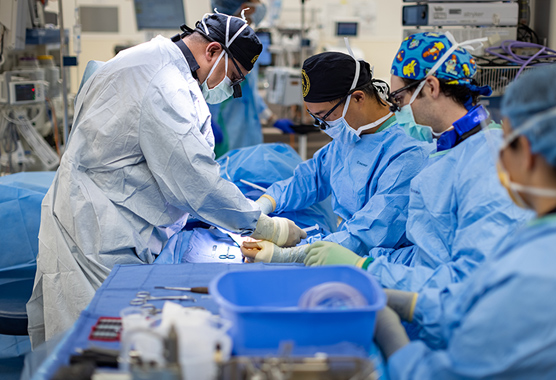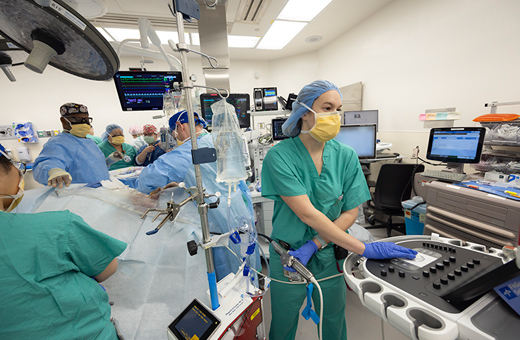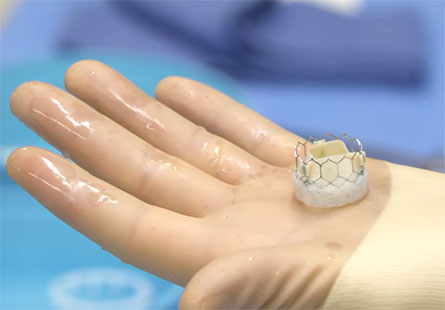TAVR
Our specialists will replace your damaged aortic valve and help you return to the life and activities you enjoy.
Medically reviewed by Jeffrey Southard, M.D. on July 15, 2025.

Expertise in Transcatheter Aortic Valve Replacement (TAVR)
TAVR is a minimally invasive procedure that reduces your recovery time. We use a catheter (thin tube) instead of open-heart surgery to replace your aortic valve. TAVR treats aortic valve stenosis, a serious condition that narrows the opening in your aortic valve. This condition reduces blood flow from your left ventricle to your aorta.
In 2012, our renowned cardiology team was the first in Sacramento to perform a TAVR. We have completed more than 1,800 procedures since then. Our expertise ensures you’ll receive the highest level of care.
Our Approach to TAVR
Transcatheter Aortic Valve Replacement (TAVR) - A Less-Invasive Alternative to Open Heart Surgery
Transcatheter aortic valve replacement allows us to replace your aortic valve without traditional surgery. You’ll experience less pain, little scarring, a lower risk of infection, and reduced recovery time.
Transcatheter means we use a thin tube (catheter) to perform your heart valve replacement procedure.
During the procedure, your provider guides a catheter to your heart and inserts your new replacement valve through the catheter. The replacement valve expands inside your diseased valve and takes its place.
Request an Appointment
As Sacramento's No. 1 hospital, you'll benefit from unique advantages in primary care and specialty care. This includes prevention, diagnosis and treatment options from experts in 150 specialties.
Referring Physicians
To refer a patient, submit an electronic referral form or call.
800-4-UCDAVIS
Patients
Call to make an appointment.
Consumer Resource Center
800-2-UCDAVIS
Benefits of Transcatheter Heart Procedures
During transcatheter procedures, like TAVR, a cardiologist accesses your heart using a catheter. They insert the catheter into a blood vessel, typically located in the leg. Because the chest is not surgically opened, you benefit from:
- Decreased blood loss
- Faster recovery
- Less pain
- Lower infection risk
- Minimal scarring
- Shorter hospital stay
A transcatheter heart procedure can dislodge particles called embolic debris. Although rare, these particles may enter the bloodstream, increasing stroke risk. We are the only ones in Sacramento using the Sentinel™ Cerebral Protection System to help protect against possible strokes.
Your provider will give you instructions to prepare you for TAVR, including when you should stop drinking, eating, or taking medications. You may need to stay in the hospital for one or more days after your procedure. You will need someone to drive you home from the hospital.
-

Pre-Operation
On the day of your procedure, we will set up intravenous (IV) therapy through a vein in your arm. We will deliver any fluids and medications you may need before, during, and after your procedure through this IV.
-

During Surgery
Some patients receive medicine in their IV that puts them in a deep sleep, known as sedation, before the procedure begins. However, some patients are not put to sleep. Sedation is used for your comfort.
-

Post-Operation
You will wake up and be able to talk right after your procedure. You will go to a recovery area and may stay in the hospital for a day or more after your TAVR.
Home Care After TAVR
You will receive specific instructions for recovering at home from your provider. You will also schedule follow-up appointments with your provider.
Care For Your Incision
Keep your incision site clean and watch for redness, swelling or signs of infection (these are rare).
Do Your Breathing Exercises
Your provider will give you instructions for breathing exercises during your recovery. The exercises help keep your lungs clear.
Monitor Your Symptoms
Call your provider immediately if you experience bleeding from the incision site, chest pain, dizziness or shortness of breath.

Ranked among the nation’s best hospitals
A U.S. News & World Report best hospital in cardiology, heart & vascular surgery, diabetes & endocrinology, ENT, geriatrics, neurology & neurosurgery, and pulmonology & lung surgery.

Ranked among the nation’s best children’s hospitals
U.S. News & World Report ranked UC Davis Children’s Hospital among the best in pediatric nephrology, orthopedics*, and pulmonology & lung surgery. (*Together with Shriners Children’s Northern California)

Ranked Sacramento’s #1 hospital
Ranked Sacramento’s #1 hospital by U.S. News, and high-performing in aortic valve surgery, back surgery (spinal fusion), COPD, colon cancer surgery, diabetes, gynecological cancer surgery, heart arrhythmia, heart failure, kidney failure, leukemia, lymphoma & myeloma, lung cancer surgery, pacemaker implantation, pneumonia, prostate cancer surgery, stroke, TAVR, cancer, orthopedics, gastroenterology & GI surgery, and urology.

The nation’s highest nursing honor
UC Davis Medical Center has received Magnet® recognition, the nation’s highest honor for nursing excellence.

World-class cancer care
One of ~59 U.S. cancer centers designated “comprehensive” by the National Cancer Institute.

A leader in health care equality
For the 13th consecutive year, UC Davis Medical Center has been recognized as an LGBTQ+ Healthcare Equality Leader by the educational arm of America’s largest civil rights organization.



